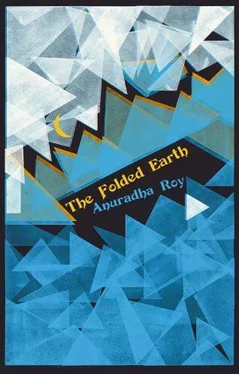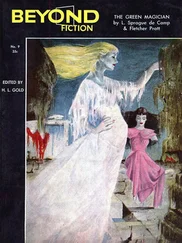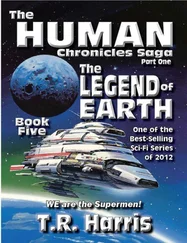In winter, the air is clear enough to drink, and your eyes can travel many hundreds of miles until they reach the green of the near hills, the blue-grey beyond them, and then the snow peaks far away, which rise in the sky with the sun, and remain suspended there, higher than imaginable, changing colour and shape through the day. Every hour, they come closer, their massive flanks clearly visible, plumes of cloud smoking from their tips. After the last of the daylight is gone, at dusk, the peaks still glimmer in the slow-growing darkness as if jagged pieces of the moon had dropped from sky to earth.
These are secrets hidden from those who escape the Himalaya when it is at its bleakest: the mountains do not reveal themselves to people who come here merely to escape the heat of the plains. Through the summer they veil themselves in a haze. The peaks emerge for those devoted to them through the coldest of winters, the wettest of monsoons. The mountains, Diwan Sahib said in an uncharacteristic rush of sentimentality fuelled by a few drinks at his fireplace, believe that love must be tested by adversity.
It was more or less the last thing he said. He got up to poke the fire and go to the bathroom. “Fix me another drink please, Maya,” he said and half-stumbled to the door, from where he called in a voice too high to be his own, “Switch on the light, why is it so dark, I can’t see.” Before I could reach him, he had crumpled over the arm of a chair and was sliding to the floor. He had grown so thin that I thought I would be able to move him easily enough to his bed, but he was too heavy to shift, and I could see there was no need.
* * *
The night Diwan Sahib died, I realised that I had never experienced death at first hand. The two people closest to me had died far away: Michael’s death happened with a telephone call. My mother’s death too had reached me the same way — this time it was a call from my uncle. To prevent my rushing to Hyderabad for her funeral, my father had forbidden anyone from telling me until after she had been cremated.
I had no idea what to do. Ama and the protocols of death took over. She ordered everyone about, even Himmat Singh, who bathed Diwan Sahib’s body and laid him out on the living room floor dressed in formal clothes I had never seen before. They were too large for him and his arms disappeared into the sleeves, which the postman folded up so that his long-fingered, square-nailed hands could be seen. They stuffed balls of cotton wool into his nostrils. Someone covered him with a brown and maroon checked sheet and pulled the sheet over his face. Ama placed an incense holder on his chest, and lit half a dozen incense sticks. “Why can’t he stay in his bed till the morning?” I asked Ama, but she pronounced: “That is not how we do it here.”
People came from everywhere: many I did not recognise, as well as Mr Qureshi, the General, Puran, Ramesh, even Mr and Mrs Chauhan. Ama took up a position right before Diwan Sahib’s body, where she sat utterly still, hooded in her sari, as mourner-in-chief. When someone new came in, where she would normally have erupted into a loud Namaste and a volley of questions, not the suggestion of a smile altered her expression of rigid solemnity. We sat in a gloomy circle around Diwan Sahib’s body all night, though the men took turns to go outside into the freezing garden, and stood swathed in shawls, warming their hands at a brazier, a fire-lit cabal that smoked, drank. Diwan Sahib would have joined them, I thought. He never did anything merely because it was expected of him. He would have cracked jokes. He would have finished a whole bottle of his rum.
Halfway through the night we heard a loud creaking, cracking, splintering, groaning sound like a giant’s death rattle, and then a huge falling. It was a rotted old tree that woodcutters had been sawing at for the past three days and the sudden gale that struck up after midnight had finally torn the trunk from its base. The men outside marvelled at the coincidence and said: “Diwan Sa’ab has taken a whole tree with him. The forest is mourning.”
After his cremation early the next day, I occupied myself clearing out Diwan Sahib’s room. The unused medicines I threw in a bin. There were empty rum and gin bottles behind curtains, under the table, under Diwan Sahib’s bed. Books towered by his bedside in piles that tottered when touched. Anthropology, the folklore of Kumaon, histories of India, hardbound volumes on the flora and fauna of the Himalaya, records of appointments in the princely state of Surajgarh. A set of cassettes with recorded birdcalls. No more performances from Diwan Sahib, the children at the school would have to settle for those tapes now. A tickertape of thoughts ran relentlessly through my head. His closest relative was probably Veer, but how would we get in touch with him when he was unreachable somewhere in the high Himalaya? In the absence of anyone else, I would have to deal with the pedantic after-death chores. I did not know if he had medical insurance or if he had left instructions for his bank accounts. I probably needed to write to someone about stopping his pension. And what about that lease for the house? It had not been renewed in the end. I would have to find Ama and Puran somewhere to live if the house had to be returned to the cantonment. And where would I live? My mind went over and over the same thoughts, but all of them were punctuated by one question as unending and softly insistent as the Scop’s Owl’s hooting: where was Diwan Sahib’s Rolls Royce cigarette case? Now that he was gone, it was imperative that I should have it. There was no other object I associated more closely with him. I needed to find it. I would turn the house inside out if I had to.
But first I had to finish with his room. I folded Diwan Sahib’s worn-out blankets and put them in a cupboard. Stripped the bed of its sheets. Busily I reached for his pillow. That was when I saw that it still held the hollow of his head and a few white strands of his hair.
I sat down on his sheetless bed. I had not lost my composure when he died, or at his cremation, despite the incongruous cascade of red roses at the cremation ground, and the thrush that insisted on whistling in accompaniment to Mr Qureshi’s noisy tears, or even when the blue-yellow-red paragliders performing for the Regimental Reunion floated past us over the smoke from Diwan Sahib’s pyre like two brilliantly-coloured birds. At the sight of that pillow and the strands of his hair, I became un-joined.
I left the house and went down to my cottage. A deadening inertia closed its fist around me. I began to feel sleepy all the time. I stopped going to work. I do not know what I did. Things rotted, dust settled, the alarm clock clanged every day at six in the morning, but I did not get out of bed, nor did I bother to change the clock’s setting to stop it ringing the next day. Maybe I slept. I think I ate at times. I had no memory of it, nor any recollection of crying, yet when I woke up at odd times in the middle of the day or night, my face was wet with tears. In my dreams, my mother, Michael and Diwan Sahib were trapped in unlikely, fear-freighted situations. We could not find each other at crowded stations. Someone was left behind on a boat at sea which had glided far out into the water. We were in different rooms of the same house, I called their names but nobody answered. An enormous bird with a curved beak and sharp talons came and sat on my arm in one of my dreams, making me wake up in a panic, rubbing my arm where its claws had been. Sometimes Veer was there, but we were in rooms filled with trekkers, rucksacks, strangers sending us off in two different directions. I heard Ama calling my name or Charu saying, “Did the postman come? Look, here is a letter for me, read it out,” but when I unglued my tight-shut eyes, I knew I had dreamed their voices.
Читать дальше












